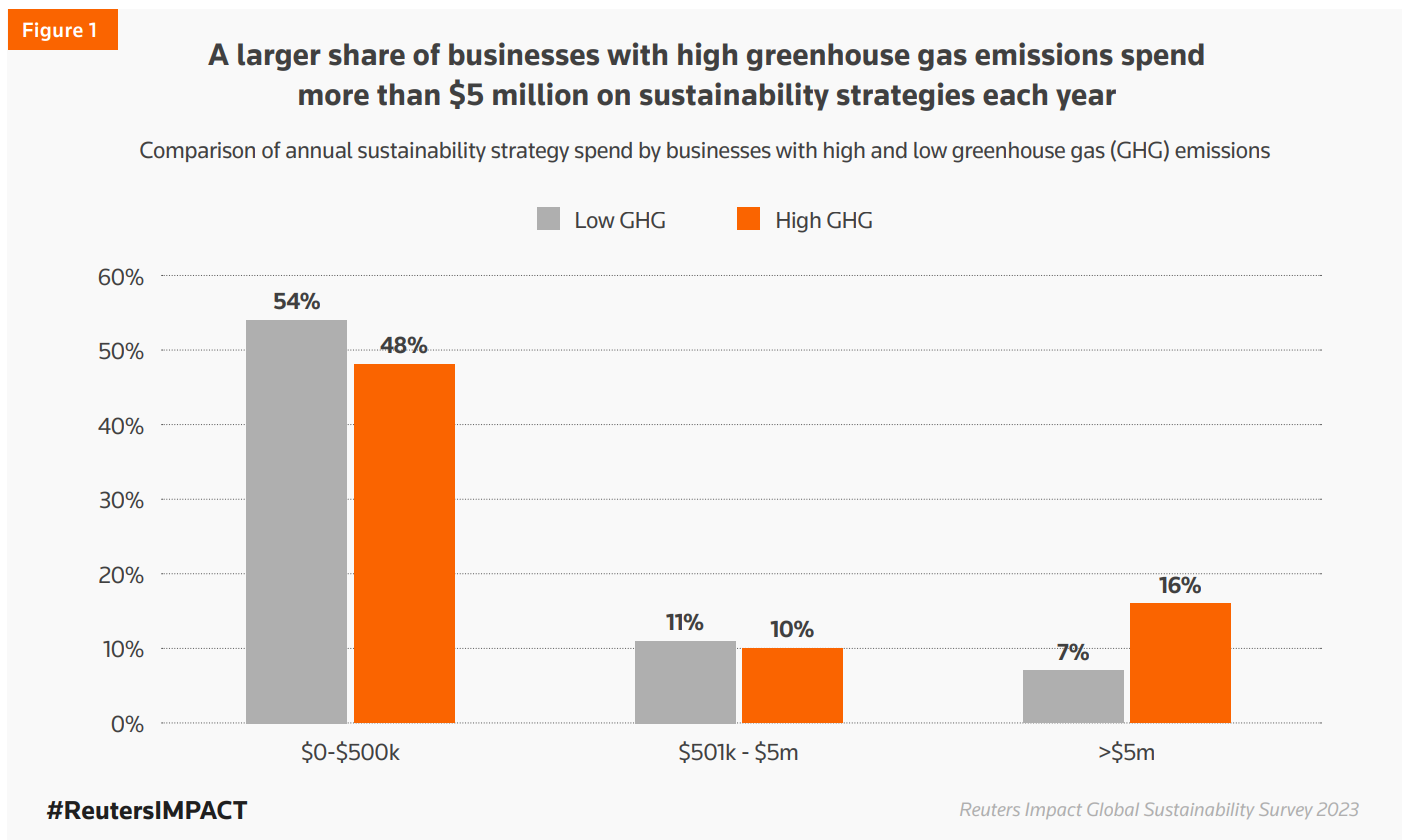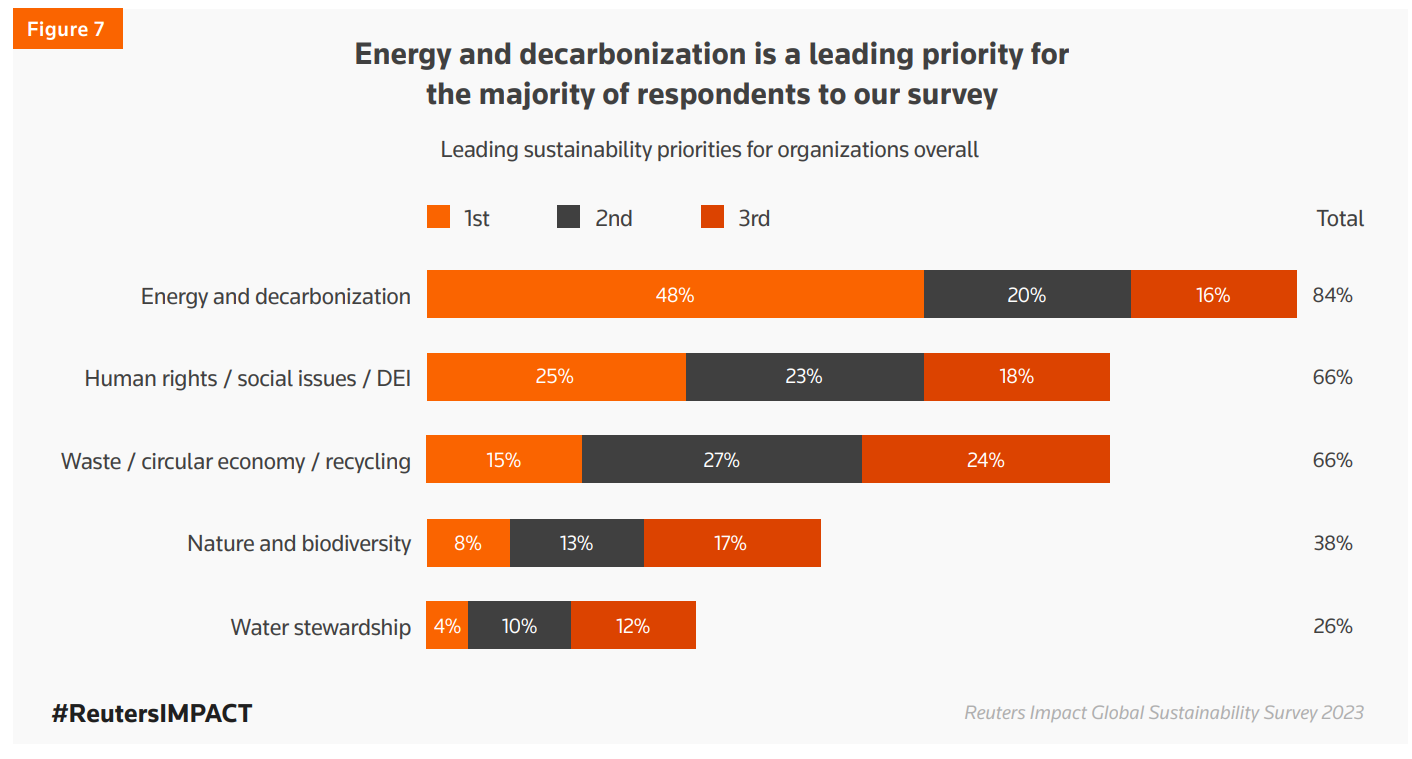With sustainability increasingly climbing up corporate agendas, decision-makers are navigating two primary disruptions — the pressure to decarbonize operations and the regulatory need to report
Many businesses are preparing for more comprehensive sustainability reporting requirements by investing in a range of different tools and technologies; however, the direction of investments looks set to change over the next three years in tandem with growing demands.
While data analysis solutions, emissions accounting solutions, and process improvement technologies are the top three destinations for investment dollars today, according to research conducted by Reuters Events. This will change by 2026, however, with environmental, social & governance (ESG) data management platforms, sustainability risk management solutions, and emissions management solutions growing in popularity.
The introduction of more complex reporting requirements, alongside a growing acknowledgement of the business risk posed by ESG compliance, is triggering investment in a broader range of tools. With Scope 3 reporting requirements — as mandated within the European Union’s Corporate Sustainability Reporting Directive (CSRD) and proposed by the U.S. Securities and Exchange Commission — set to become the de facto standard for ESG reporting over the coming years, investment in this area is also expected to grow.
A large majority of respondents to the Reuters Impact Global Sustainability Survey 2023 — nearly 80% — said they expect sustainability-related investments to increase. However, our research also indicates that larger companies are more likely to expect an increase in sustainability investment than small or medium-sized enterprises (SMEs).
Our research also indicates more of a link between company size (both in revenue and headcount), organizational structure (private versus publicly listed), and the level of greenhouse gas (GHG) emissions and current investment levels compared to other businesses in their respective industries.

Not surprisingly, companies with higher GHG emissions, publicly listed organizations, and larger businesses are more likely to spend greater sums on sustainability, irrespective of the industry in which such companies operate. These are therefore important factors for benchmarking sustainability strategies against peer groups.
Despite a perception that Europe remains ahead of North America in sustainability, our research identified little divergence between organizations operating in the two regions, with investment profiles largely similar. Some more marginal differences — such as that respondents operating in Europe are more likely to invest in ESG data management platforms and sustainability risk management solutions than those operating in North America — could be reflective of stricter reporting demands currently in place. That respondents operating in North America indicated a greater swing towards investing in emissions management solutions in the short-term than our global average could, however, may suggest that taking action is a universal ambition.
Irrespective of regional differences, energy & decarbonization is the highest sustainability priority area for organizations today. More than 80% of respondents to our survey selected energy & decarbonization among their top three sustainability strategies, with almost half (48%) citing it as their leading priority currently. This is being tackled in numerous ways, such as increasing operational efficiencies and investing in renewable energies, with success largely being measured in the reduction of Scope 1, 2, and 3 emissions, albeit to differing levels.
There are also more subtle differences in approach to and metrics for measuring the success of sustainability strategies between respondents operating in North America and Europe, such as recognition of diversity, equity & inclusion (DEI) in the workforce as well as nature- and biodiversity-related actions. These indicate not just how broad approaches to sustainability are for modern organizations, but also how many possible solutions present themselves on the market.

The role of, and demands upon, sustainability practitioners and decision-makers continue to evolve at speed. Our research has outlined that while sustainability budgets are set to increase over the next three years, businesses are setting priorities and investing in a broader suite of tools and technologies to help meet growing targets and compliance requirements. The most popular tool or technology used today — data analysis solutions — was selected by 38% of respondents.
The technologies favored for investment in 2026 suggest that different challenges are looming on the horizon, especially requirements for Scope 3 emissions reporting, which the CSRD requires of listed SMEs by 2026. These will require different tools and capabilities, of course, and will almost certainly require more investment. In fact, 74% of respondents surveyed said investment at their companies will grow over the next three years, 26% of whom said they expect an increase of between 6% and 10%.
There is therefore little doubt that the business community is treating sustainability with growing importance and urgency. And while most organizations would also appear to have a strong understanding of their immediate plan, our research indicates that the uncertainties lie in how to tackle the disruptions on the horizon for the years ahead.
You can access a copy of the Reuters Impact Global Sustainability Survey 2023 here.







